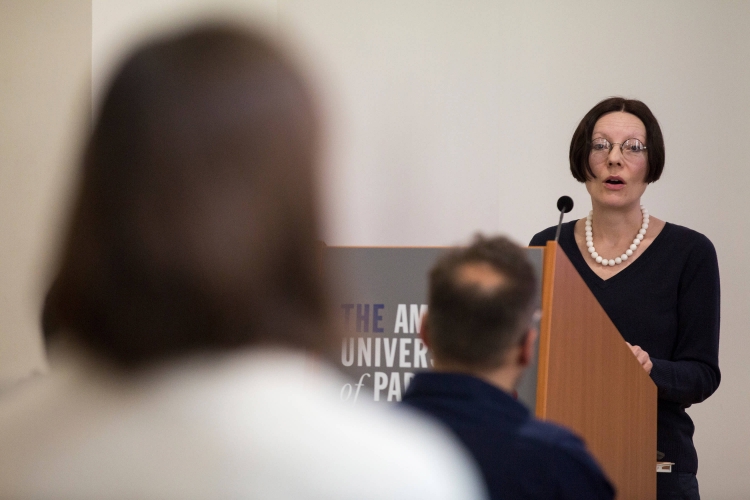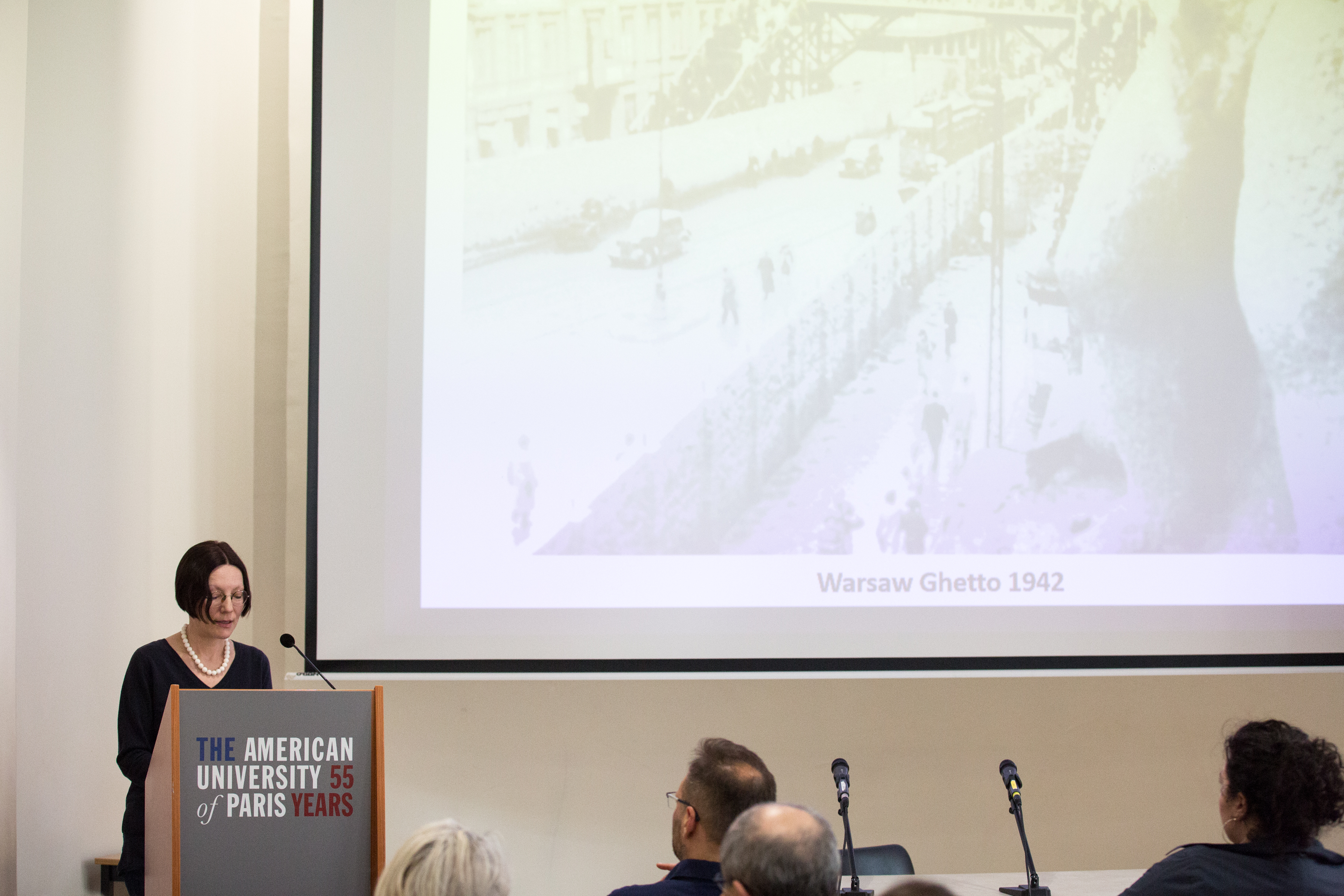Elzbieta Janivka: When Denial Becomes State Policy

On April 5, 2018, the George and Irina Schaeffer Center for the Study of Genocide, Human Rights and Conflict Prevention welcomed Elzbieta Janicka to share "When Denial Becomes State Policy: The Origins and Significance of the New Holocaust-Speech Law in Poland." In essence, the law criminalized free debate about the Holocaust in Poland. Considering that the country is a democratically elected parliament, the fact that this law not only passed but was also given 70% public support may seem out of character. In response, Janicka discussed the some of the lesser known points backing this law, including historical events and details that influenced the relationship between the Polish and the Jews leading up to the law's formation.
She started by diving into the past and bringing up problems with the way postwar Polish society and culture dealt with their own anti-semitism. Instead of acknowledging their mistakes, the Polish "refused to reflect the true state of affairs". They avoided confrontation in a number of ways. From trying to put Jews in a bad light by suggesting that Jews slandered Polish people out of ungratefulness, to eliminating victim's names from the most popular Polish narrative about the Holocaust, Polish society, in general, was adamant in 'refusing responsibility' for the way they treated Jews.
Following the immediate reactions, a different narrative emerged in the 1980s. This time, Poles called themselves bystanders or witnesses, passive out of helplessness. The majority were either 'powerless or indifferent'. This narrative, as Janicka put it, "signified the maximum truth limit" Poles could attain. Reality lies in the proof of Jewish massacres, famously recounted through books, which include examples such as when several hundred Jews were burned alive in a bar. But, according to the official authorities, the accounts were "exaggerated" tales, "from the sick Jewish Imagination."
Years down the line, the case did not seem to get brighter. Those who tried to tell the truth or wanted to investigate further were often ostracized from their communities. One family had to flee Poland because of this. Eventually, Poland got to a place where it was ready for 'self-liberation' and 'self-emancipation' to regain independence in 1789. But this all collapsed after the second European Union Minorities and Discrimination survey.
Literary scholar Elzbieta Janicka speaks to a crowd of AUP faculty, students and guests during her talk entitled "When Denial Becomes State Policy: The Origins and Significance of the New Holocaust-Speech Law in Poland," hosted by the George and Irina Schaeffer Center for the Study of Genocide, Human Rights, and Conflict Prevention. Image Credit: Gabriel GreenIn 2004, Poland ascended to the EU. At this point, it seemed like they would finally have to face the past. But, the backlashes proved instead to be stronger. For example, a museum was created for the Polish-Jews, but due to heavy censorship from the president, lacked any real information about the Jews and mainly focused on the Poles. After a while, the 'Jewish' part of the museum's title was eliminated altogether. Old narratives were re-loaded, such as the painting of the 'passive Polish bystander'.
Alongside these old narratives came a new one, which was widely disseminated. This one starred the 'cursed soldiers', strong anti-communist and anti-soviet fighters who rose during WWII. The problem with lauding these fighters, and focusing on the anticommunist movement, is that the concept served a 'garbage bag' for negative parts of Poland's history. Tossed into the lot were Stalin's crimes, the deportations to Siberia, women's rights, social justice, trade unions and reasons for left-wing orientation from Polish parliament. The dominant discourse here was that nothing, not even antisemitism, was worse than Communism. Furthermore, in some ways, antisemitism fell under anti-communism. In following, the Poles excused their past behavior towards the Jews as another perilous effect of Communism. A different theory that arose was the 'double genocide theory', which deemed that 'everyone was equally hostile'.
For many years, the Polish tried to hide instead of face the truth, and are now finally admitting that the past was much worse than they let on.
Today, as Janicka put it, a 'hybrid' exists in Poland. The authorities showcase a 'democratic facade' while hiding or eliminating disturbing facts. She said, "Before our eyes, a counter-reality is being shown as reality and confirmed by law"
The Polish parliament and the speech law show how that the government is 'only concerned with the reputation of the country'. "But, it's a Freudian slip. The more you try to hide, the more it becomes evident." For many years, the Polish tried to hide instead of face the truth, and are now finally admitting that the past was much worse than they let on. But what's keeping them from completely opening up?
Janicka finished her lecture with a passionate punch, "If they talk seriously and legitimatize the crime, they would have to build a counter-society and counter-culture. This would endanger the symbols of powerful social actors." She described it as a counter-revolution to a non-existent revolution which threatened something worse than the 'end of the world.' As she saw it, this situation was attacking the very heart of Poland.








